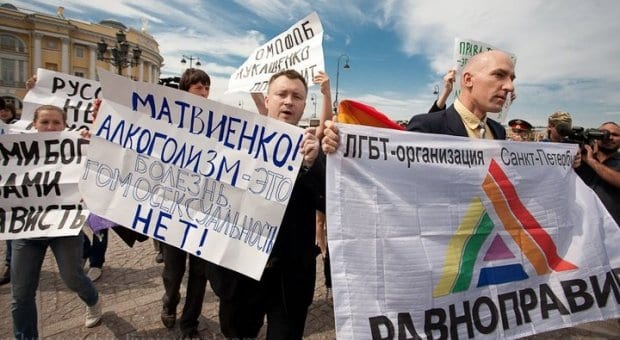One of Russia’s most prominent activists is promising to hold a Winter Pride march in Sochi’s city centre hours before the start of the Olympic opening ceremonies Feb 7.
Nikolai Alexeyev, a lawyer who’s the head of the Moscow Pride organizing committee, posted the announcement on Facebook.
“It’s official! Organizing Committee of Moscow Gay Pride and founders of the banned Pride House Sochi decided today against the boycott of Winter Olympics in Sochi and instead to organize Winter Sochi Pride on the day of the opening of Olympic Games on 7 February 2014. Join us! It will be much more effective to draw attention to official homophobia in Russia all around the world and expose the hypocrisy of the International Olympic Committee which went into discriminatory agreements with Russian regime and of the European Court of Human Rights which still has not considered our complaint concerning the unlawful denial to register Pride House Sochi! Vive Sochi Pride 2014!”
Alexeyev tells Xtra the Winter Pride march will take place at noon, eight hours before the start of the opening ceremonies. That allows enough time for international media to complete a story before the ceremony begins, he says.
“The timing is brilliant for media before the opening [ceremony],” he says.
Alexeyev is encouraging people to use the hashtag #SochiPride2014.
He says he is well aware Russian authorities will try to stop activists and perhaps even target organizers with violence at some point in the next six months. But during the Olympics, he says, the international attention on Russia should offer activists some protection. “I think the violence might not happen, but all is possible,” he says, adding that if police try to arrest people, “disrupting the gay pride will be a huge blow for the host country. I think they will do all they can [to ensure] we do not reach the [Sochi city centre]. But the world will be closely watching.”
Russian gay activists have been galvanized by the outpouring of international support and calls for action this week in the wake of the passage of anti-gay legislation in Russia on June 30, Alexeyev says. Dan Savage, Cleve Jones and others have called for a boycott of all Russian vodka. The idea is now quickly catching on at gay bars around the world. Jones is also calling for an international day of protest on Aug 3 at sunset.
But Alexeyev has criticized the vodka boycott, instead encouraging people to target homophobic politicians by writing to world leaders demanding that Russian lawmakers be added to black lists for entrance visas. “We have to invent new ways of protest,” he says, “And [we must] use all opportunities.”
The International Olympic Committee (IOC) has announced that athletes and fans attending the Sochi Olympics will be exempt from Russia’s anti-gay laws. But where does that leave Russian LGBT people? Alexeyev asks. Are they exempt as well? Even if they are, LGBT people must live with the laws once the international media turn off their cameras and return home.
“The statement of IOC is apartheid and should be strongly condemned by all progressive international community,” he says. “I am sure Adolf Hitler also gave assurances to the IOC that Jews and black people will not be punished or prosecuted by the Nazis at Berlin Olympics in 1936. The result is known to the world. We are not second-class citizens.”
One Russian law, aimed at protecting “minors,” bans all pro-gay speech and actions, especially anything that may cause a “distorted understanding” that gay and heterosexual relations are “socially equivalent.” Those convicted can be arrested or fined. Another law allows police to arrest tourists and foreign nationals they suspect of being homosexual, lesbian or “pro-gay” and detain them for up to two weeks.

 Why you can trust Xtra
Why you can trust Xtra


